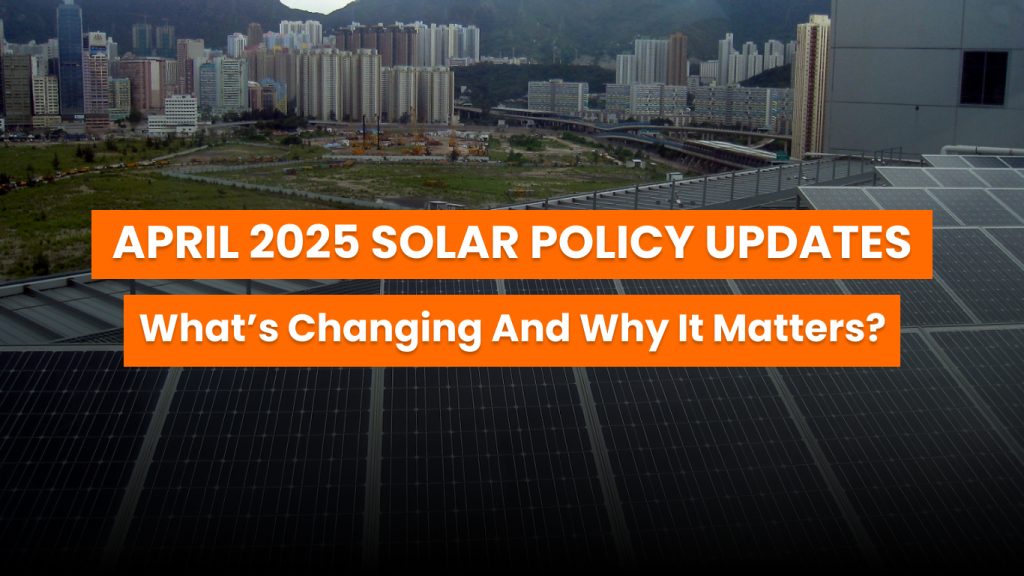April 2025 solar policy updates: As we step into the second quarter of 2025, the landscape of solar energy in the United States continues to shift. Policy changes, regulatory decisions, and legislative developments are shaping how solar companies, investors, and everyday Americans move forward with clean energy adoption.
From tariff threats to clean energy funding and solar program reforms, April has delivered a series of high-stakes developments. Whether you’re part of the solar industry or simply following the evolution of renewable energy, staying up-to-date on policy is crucial. Here’s what’s been happening and what it all means for the future of solar in the U.S.
Tariff tensions return: Trump administration eyes new 25% duties
In a move that has created uncertainty across multiple industries, the Trump Administration has revived the idea of imposing 25% tariffs on goods imported from Canada and Mexico. This discussion has been ongoing since February, and while the tariffs technically went into effect in early March, there was a brief reprieve.
President Trump has temporarily paused the tariffs on items that comply with the United States-Mexico-Canada Agreement (USMCA), but only until April 2. The pause, first reported by Yahoo Finance, gives businesses a narrow window to adapt. However, the threat of future tariffs still looms, causing concern for solar manufacturers and suppliers who rely on cross-border trade.
What this means for solar
Many solar components, such as inverters and mounting hardware, are sourced or assembled in North America. Tariffs can increase costs, delay timelines, and create supply chain headaches. For solar developers and distributors, this policy back-and-forth adds an unwelcome layer of unpredictability just as the industry is ramping up production and deployment.
GOP lawmakers rally behind IRA as budget debates begin
As Congress began crafting the federal budget for 2025, a surprising bipartisan moment emerged in March. Twenty-one House Republicans, led by Rep. Andrew Garbarino (R-NY), signed a letter addressed to the House Ways and Means Committee, urging lawmakers to protect the Inflation Reduction Act (IRA).
Their message was clear: the long-term stability provided by the IRA is essential for planning and financing renewable energy projects in the U.S.
Why the IRA matters
Passed in 2022, the Inflation Reduction Act includes billions of dollars in tax credits, grants, and incentives for clean energy technologies, including solar power. The law’s multi-year structure allows developers to make long-term investments without fear of sudden regulatory reversals. The fact that some Republicans are openly supporting the act reflects the growing economic and job-creation power of solar and renewable energy in their districts.
EPA climate grant rollbacks spark legal and public backlash
In a controversial move, the Environmental Protection Agency (EPA), now under Secretary Lee Zeldin, took major steps in March to reverse several Biden-era climate initiatives. On March 12, the agency announced what Zeldin called the “greatest and most consequential day of deregulation in U.S. history,” slashing funding and rolling back key environmental protections.
One of the biggest targets was a planned $20 billion in climate-related grants. However, the rollback was quickly met with resistance. According to CBS, a federal judge has temporarily blocked the defunding of these grants, stalling the administration’s deregulation effort—at least for now.
Solar for All program survives—so far
Despite the sweeping changes, the Solar for All program has not been affected yet. This initiative aims to provide clean solar energy access to low-income households and underserved communities. Advocates hope the program’s exclusion from recent cuts means it will continue to receive federal support, though its future remains uncertain.
Trump administration reverses Biden-era solar manufacturing declaration
Another major shift came with the repeal of a national security proclamation related to solar manufacturing, which had been established during President Biden’s term. The original 2022 order designated solar photovoltaic (PV) technologies as essential to U.S. national security, essentially giving domestic solar manufacturing a strategic boost.
In March, the Trump Administration rescinded that declaration, claiming it was unnecessary. The original order stated that without the designation, “the United States industry cannot reasonably be expected to provide the capability for the needed industrial resource … in a timely manner.”
What’s at stake
Removing this designation could lead to reduced investment in domestic solar production. It could also open the door for more imports, possibly undermining efforts to rebuild American solar manufacturing capacity and reduce dependence on foreign solar components. The policy change reflects a shift in how the administration views energy security and industrial strategy.
Minnesota weighs ending community solar program for low-income families
At the state level, a heated debate is unfolding in Minnesota, where lawmakers are considering sunsetting a critical clean energy program. A new bipartisan bill proposes ending the Low-to-Moderate Income (LMI) Accessible Community Solar Garden program in 2028.
This program, recently reformed, allows households that can’t install rooftop solar—often due to financial or property-related barriers—to benefit from shared solar installations. It’s particularly impactful for low-income families, renters, and small businesses.
Pushback from solar advocates
Solar advocacy groups are pushing back hard against the proposal, calling it “a gift to powerful utilities intent on protecting their monopoly and crushing competition—at the direct expense of Minnesota families and small businesses.” They argue that ending the program would reduce energy equity, hinder community participation in clean energy, and preserve the dominance of large utilities in the electricity market.
Final thoughts
April 2025 has brought a mix of progress, setbacks, and uncertainty in the world of solar energy policy. As the Trump Administration pushes deregulation and tariff threats, advocates and lawmakers from both sides of the aisle are working to preserve critical clean energy programs like the Inflation Reduction Act and Solar for All.
Meanwhile, state-level battles—such as Minnesota’s debate over community solar—highlight how local decisions can have far-reaching impacts on who benefits from the clean energy transition.
Whether you’re a solar business owner, policymaker, or someone interested in renewable energy, staying informed about these developments is essential. The policies being shaped today will determine how accessible, affordable, and scalable solar energy becomes in the years ahead.

